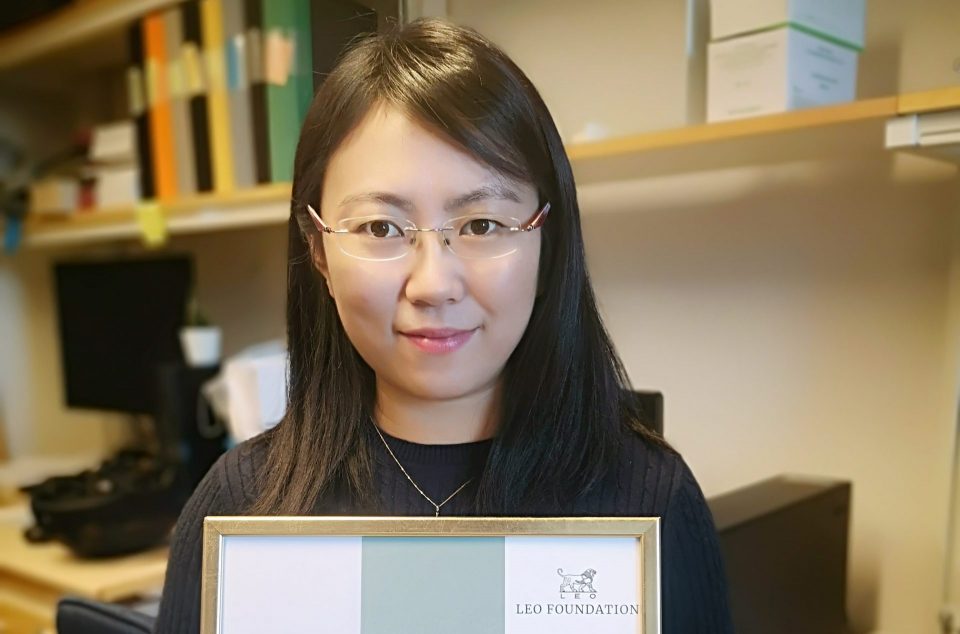09 September 2020
The 2020 LEO Foundation Award – Region EMEA is awarded to Ning Xu Landén, Associate Professor at the Karolinska Institute in Sweden. She receives the award for her high impact research in wound healing.
Wound healing is a fundamental physiological process. If the healing fails, the result is chronic hard-to-heal wounds, a common medical problem that represents an increasing health problem and economic burden to society – and effective treatment is lacking.
However, investigation of the role of so-called regulatory RNAs – an important molecule in all of our cells – provides hope to develop novel RNA-based treatments to improve healing of human skin wounds.
This year’s winner of the LEO Foundation Award in Region EMEA (Europe, Middle East and Africa) Ning Xu Landén receives the award for her significant contribution to unravel the roles of regulatory RNAs in wound healing.
Highly skilled and highly cited
Ning Xu Landén is an Associate Professor in experimental dermatology and venereology at the Department of Medicine, Solna at the Karolinska Institute in Sweden where she leads a successful research group. She is the author of around 50 scientific articles with more than 3000 citations.
“Ning Xu Landén has developed an independent niche area in microRNAs and long non-coding RNAs that represents an emerging concept and constitutes a promising area for pharmaceutical intervention,” says Ida Brams, Chief Grant Officer at the LEO Foundation. “We are very proud to offer Ning Xu Landén the LEO Foundation Award in recognition of her outstanding research. She is a highly skilled, passionate and productive young scientist with major accomplishments that will positively impact future science.”
The LEO Foundation also emphasises the fact that Ning Xu Landén’s research is performed in an interdisciplinary setting with strong collaboration with clinical departments and other national and international research groups.
High-resolution atlas of human wounds
One of the things that Ning Xu Landén and her research group is working on at the moment is what she calls a high-resolution molecular atlas of human wounds.
“I expect that my research will add new layers of knowledge to our understanding of normal skin wound healing, but also of the emergence of chronic wounds. The aim is to create a high-resolution molecular atlas of human wounds that will advance or even revolute the understanding of wound healing biology and the pathogenesis of chronic wounds. Moreover, it may open exciting opportunities for developing more effective wound therapy,” she explains.
An award for the rising stars
Since the first LEO Foundation Award in 2008 a total of 25 scientists have received the award. On the ambitions for the LEO Foundation Award, Ida Brams says:
“The award was born out of the aim of advancing the understanding and treatment of skin diseases and strengthening the pipeline of excellent dermatology researchers. It recognises promising young talents and hopefully provides a boost to their future careers. The award is well aligned with the foundation’s goal of continually promoting and advancing skin research.”
This year’s proud recipient of the award hopes that the award will raise the awareness of a research area with significant unmet needs.
“It is a great honour to receive the prestigious LEO Foundation Award. It will allow me to pursue research in the area that fascinates me and give me the opportunity to raise awareness of the research field and hopefully inspire more researchers to address this type of research. People suffering from wounds need our help,” says Ning Xu Landén.
About Ning Xu Landén
Associate Professor in experimental dermatology and venereology working in Unit of Dermatology, Department of Medicine, Karolinska Institutet, Sweden.
Started own research team at the Centre of Molecular Medicine (CMM) in 2014.
PhD in medical virology from Uppsala University, Sweden in 2008.
Postdoc research at Molecular Dermatology research group led by Professor Mona Ståhle, Karolinska Institutet, Sweden, from 2009-2013.
Awarding the extraordinary
LEO Foundation Awards are given to outstanding young scientists from around the world, whose work advance our understanding of the skin and its diseases and have the potential to pave the way for new and improved treatments.
The award is given three times annually – one in each of the three regions: Americas, EMEA and Asia Pacific. It is worth USD 100,000.
All awardees will join the LEO Foundation Alumni Club.
